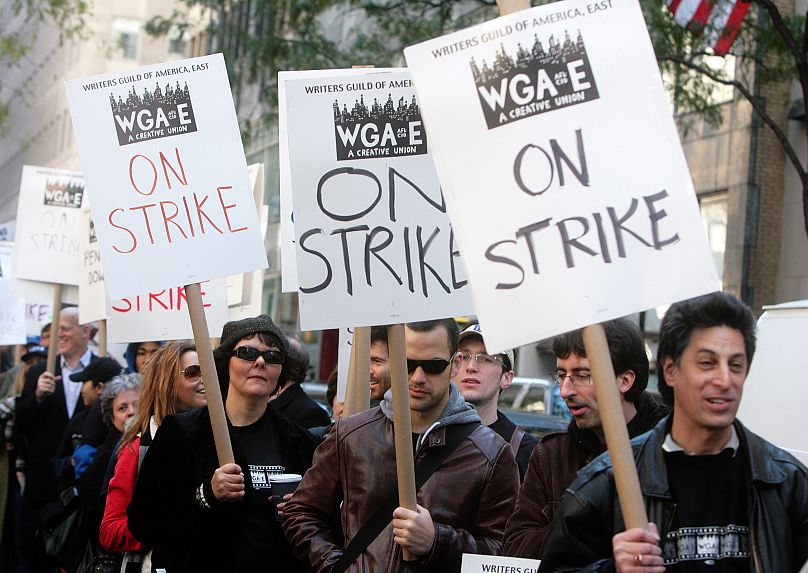The WGA hasn't gone on strike since the 2007-2008 writers strike that brought Hollywood to a standstill. The fight for fair pay from streaming platforms has brought them to the brink once again.
Hollywood’s writers have gone on strike.
Think of any US TV show or film and it was likely penned by someone represented by the Writers Guild of America (WGA). As the news comes through that the WGA has overwhelmingly voted in support of strike action, here’s your handy explainer on why Hollywood might put its pens down in protest.
The WGA represents around 11,500 screenwriters, making up a huge proportion of the writers contributing to US film and television productions. So when 97.85% of the votes came in supporting a strike, it’s clear there’s a big issue at hand.
And that issue is simple: streaming.
Since the advent of streaming platforms like Netflix becoming one of the biggest players in film and television production, it may have seemed like there were more opportunities than ever for writers. While the total number of shows and films produced has increased, the pay conditions for US writers has steadily declined.
Budgets increasing, writers' pay decreasing
The WGA released a report titled “Writers Are Not Keeping Up”, detailing the ways streaming platforms have pushed writers to the back of the priority list.
“While series budgets have soared over the past decade, median writer-producer pay has fallen,” the report notes, with reports of writers now often working for minimum fees regardless of experience, and shows limping along without fully-fledged writing teams.
The WGA union enforced a minimum wage for writers called the Minimum Basic Agreement (MBA). For staff writers working in episodic television series, the amount on MBA has increased from 86% in 2013-2014 to a staggering 98% in 2021-2022.
Across all writing roles, from staff writers to showrunners, the percentage of people working at MBA rates has risen from 33% to 49%. Adjusted for inflation, that means the average writer has taken a 23% pay cut over the last decade.
If that wasn’t bad enough, it’s reported that many writers are being forced to work for shorter contracts to produce the same work, even further reducing the amount they’re paid.
Outside of episodic television, streaming platforms like Netflix haven’t even agreed to the MBA for their hiring practices for comedy-variety shows, like talk shows.
In film, the WGA has noted the decline of DVD sales and the increased focus on tentpole blockbusters causing a total reduction in screenwriter jobs over the past decade. When a screenwriter is employed for a film, figures also show that pay has reduced by 14%, adjusted for inflation.
The fight for residuals
“While the business has boomed, and studios have collected almost $30bn in annual profits, writer pay has gone down. The studios are profoundly undervaluing writers and threatening the sustainability of writing as a profession,” said Laura Blum-Smith, the director of research and public policy at WGA West.
One of the biggest talking points of the WGA writer’s strike is the way the streaming platforms have changed residual pay, once a crucial part of a writer’s living.
Residuals are the recurring payments a writer receives for their work on a show for every time it is broadcast. For the writers of successful sitcoms like the hit show Friends that get repeated broadcasts, residuals can be incredibly lucrative.
But streaming platforms which allow users to watch shows on demand don’t have a standardised WGA agreed approach to residuals.
Last year, the WGA successfully sued Netflix for underpaying the writers of the Sandra Bullock-starring film Birdbox. While Netflix wanted to pay the writers according to a formula negotiated with other unions, the WGA argued this was below writer’s union rates.
As a result, the arbitrator found that 216 writers across 140 Netflix films needed to be paid $64 million, $20 million more than they would have received through the agreement Netflix was originally pursuing.
Will the writers actually go on strike?
While the WGA members have voted to strike, negotiations are still continuing.
The WGA are negotiating with the Alliance of Motion Picture and Television Producers (AMPTP) to see if they can agree on demands, ranging from improved compensation and residuals to regulations over use of AI in writing.
If negotiations break down though, the WGA will strike from 1 May, so time is running out for an agreement.
The last time the WGA went on strike was in 2007 when 12,000 writers put their pens down for 100 days. Different figures have been made to suggest the cost to the industry of the 2007-2008 strike, ranging from $380 million to $2.8 billion.
That strike was to demand higher residuals for the then-healthy DVD market and the burgeoning streaming market. The WGA managed to secure a requirement that streaming platforms hire unionised writers as well as a deal on the residual payments from streamed content.












